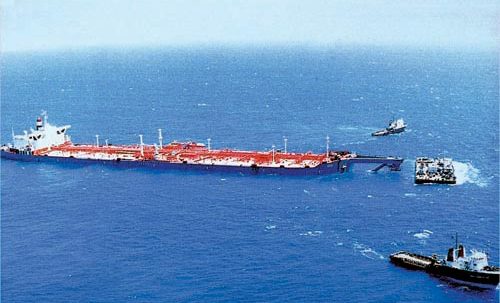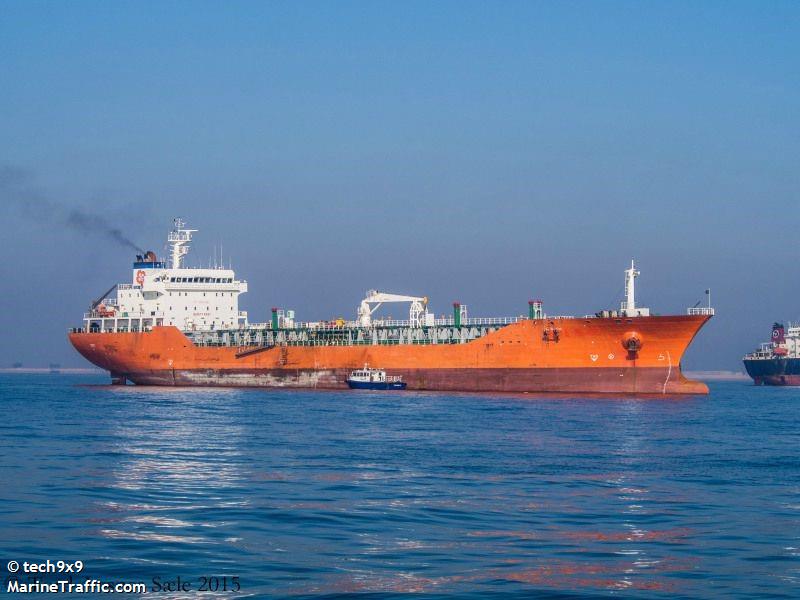FSO Safer – a ticking bomb

Author Carlos Luxul flinches at the dangerous prospect of a severe disaster off Yemen.
An environmental time bomb is ticking away in the Red Sea, where over a million barrels of crude oil may very soon leak into its waters, and the world is looking on, seemingly powerless. Perhaps powerless is not the right word. The world certainly possesses the power. What it lacks is the will.
The Ras Isa oil terminal sits forty miles north of Hodeidah, a city controlled by Houthi rebels in Yemen’s protracted civil war. Central to the terminal’s operations is the FSO Safer, a floating storage and offloading vessel. 362 min length, it was originally built as a supertanker in 1976, before conversion to its present role in 1987.
Since 1988 it has been stationed in Yemen – that’s 33 years of sitting in seawater with a particularly high salinity rating and, for the last five or six years, since the onset of the civil war, it has received little or no maintenance. Its physical condition is deteriorating rapidly and there have already been breaches to its engine compartment, though not yet to its tanks, which currently hold 1.148m barrels of crude oil, or approximately 157,000 tonnes. For comparison, the Exxon Valdez was merely carrying around 35,000 tonnes when it met with disaster.
The FSO Safer has 157,000 tonnes of crude onboard. By comparison, the Exxon Valdez was merely carrying around 35,000 tonnes when it met with disaster
Years of neglect have taken their toll. There are no reliable estimates of the present thickness of the Safer’s hull, but it is not unreasonable to assume that it is down to its last few millimetres in certain places, masked by the presence of a generous coating of marine encrustation. And those who recognise black humour will not be shocked by the irony in its name.
All interested parties, including Yemen’s warring factions and the proxy belligerents of Saudi Arabia and Iran, understand the imminent threat of a catastrophic oil spill, but years of UN dialogue and negotiation shows no sign of resolution. Iran, naturally, will not rein in its Houthi partners, but Iran is nothing if not pragmatic, so a deal must be doable.
As ever, money is central to the impasse. 1.148m barrels of oil are worth just shy $50m at current market prices – a sizeable chunk of money the Houthis are laying sole claim to. And while they are receiving no financial guarantees, they are not permitting UN access to the vessel. They are also dropping strong hints that they have mined the waters around it and rigged it internally with IEDs.
Needless to say, the Red Sea is an ecological wonderland containing one of the world’s largest and most important coral reefs. Its currents and winds alternate in summer and winter, switching between northbound and southbound. An oil spill will either spread north along the shores of the Red Sea’s littoral countries, or south to the coastlines of Djibouti and Somalia, and then out into the wider Indian Ocean, where prevailing currents may sweep it down the coast of East Africa.
The world’s interests in the Safer are being led by the UN, which perversely presents it with an opportunity to demonstrate a purpose beyond being a mere talking-shop. We must not entirely blame the UN though, which is rendered toothless without the committed backing of its member nations, whose political classes use it as a convenient scapegoat for their own inaction and a buffer to hide behind.
The world possesses everything it needs to prevent an unmitigated disaster. It has the military power to secure the location and the technical expertise to secure the ship and its cargo.
Now is surely the perfect opportunity for the world’s political leaders to show their mettle and the UN to demonstrate its raison d’être. Our rulers face a stark choice. Either they can choose to take action and firmly back the UN, or once again they can look away and wring their hands before tapping out the usual platitudes on Twitter.
The climactic disaster scenario of my novel, The Ocean Dove, is rooted in plausibility and could so easily happen, though I sincerely hope it doesn’t.
Meanwhile, back in real life, the Safer disaster is just waiting to happen if the world fails to act.

 , a floating storage and offloading vessel. 362 min length, it was originally built as a supertanker in 1976, before conversion to its present role in 1987.
, a floating storage and offloading vessel. 362 min length, it was originally built as a supertanker in 1976, before conversion to its present role in 1987.
Info about Exxon Valdez Is incorrect. The vessel was carrying much more, about 160000 MT. The Spilled quantity was around 37000 MT.